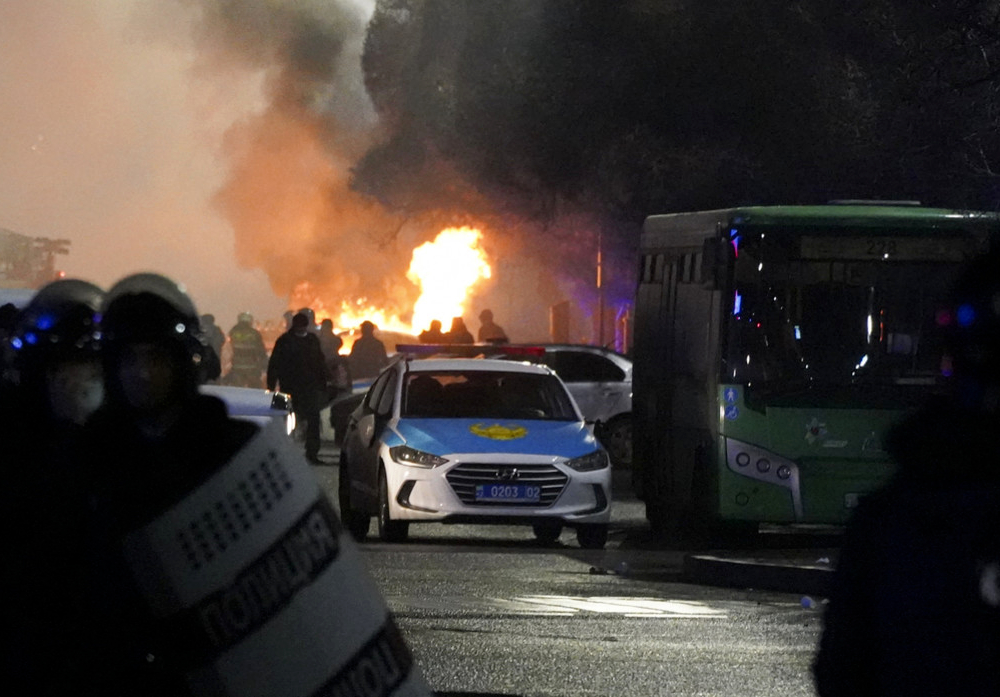On 3rd of January, protests over gas prices escalated into riots and looting in Almaty, Kazakhstan. Russia, China, and the Organization of Turkic States (OTS) called for order and stability, Russia and Belarus sent troops into Almaty in response to the Kazakhstani government’s call for aid, while elsewhere Chinese aid to Afghanistan continued, and China announced the opening of a new consulate in Iran to facilitate the expansion of the Belt & Road Initiative (BRI).

Image source: RT
On January 3rd a march towards the Akimat building in Almaty, Kazakhstan devolved into a riot that spanned most of the city center after the local police fired tear gas at protestors (Yenifax, Eurasianet, NYTimes). The same night, rioters seized and/or burned down the Akimat as well as several government buildings (including the presidential residence), TV stations, and the Almaty International Airport. Widespread looting also took place and firearms were among the items looted by the rioters. In response, President Jomart Tokayev declared a nationwide state of emergency until the 19th of January and called for military aid from the Collective Security Treaty Organization (CSTO), which marked the first of such involvement since the CSTO was founded. A curfew was also enacted and the internet was shut down from the 3rd to the 7th of January.
China, Russia, and the Organization of Turkic States called for stability in Kazakhstan. Additionally, Russia and Belarus sent approximately 2000 troops to Almaty in response to the CSTO request. Dozens are reported dead and injured both among civilians and government forces, though the exact numbers of casualties are not available at the time of writing. While looting and property damages were widespread, it was reported that the Chinese businesses have not been affected so far (SCMP). After the government regained control of the city, foreign troops began to withdraw on the 13th of January. The President claims that Islamist and foreign militants are responsible for the incident, though no evidence was provided (Eurasianet). Another, more credible explanation for the event seems to be the possibility of a power struggle between the followers of the old president Nursultan Nazarbayev and the new president Jomart Tokayev (NYTimes). Considering that Tokayev also assumed the chairmanship of the National Security Committee (Caspian News), a life-long post that formerly belonged to Nazarbayev, it seems that the Tokayev faction may have won out.
Both Russia and China are opposed to the idea of a revolution in Kazakhstan similar to the ones that occurred in Ukraine and Kyrgyzstan (Chinadaily, Eurasianet, TRTWorld). Russia, because it considers Kazakhstan a part of its sphere of influence (called “the near abroad”), and China, because Kazakhstan is a vital lynchpin and the origin of the BRI. Xi Jinping also congratulated Kazakh president Tokayev on the crackdown. Considering the protests and riots were quelled in short order, both countries’ interests in Kazakhstan are likely to remain safe in the near future though whether Kazakhstan will drift closer towards one or the other, or will continue on balancing between the two, remains to be seen.
In other news, Chinese aid to Afghanistan is said to continue (Xinhuanet). Up to 200 Afghani families have received aid from China, and the two countries are reportedly seeking to deepen economic ties. However, the Afghan ambassador to China left his post this week after not being paid for several months (India Today). This highlights the economic woes faced by the Taliban government after their takeover of Afghanistan in September 2021.
China has also established a new consulate in the Iranian port city of Bandar Abbas (Silk Road Briefing). This consulate is projected to facilitate a greater number of Chinese businesses in the city than was previously possible and stands as another expansion of the BRI. Iran is likely to be another key area of interest for China because it will be connecting the land-based BRI and the sea-based String of Pearls.

